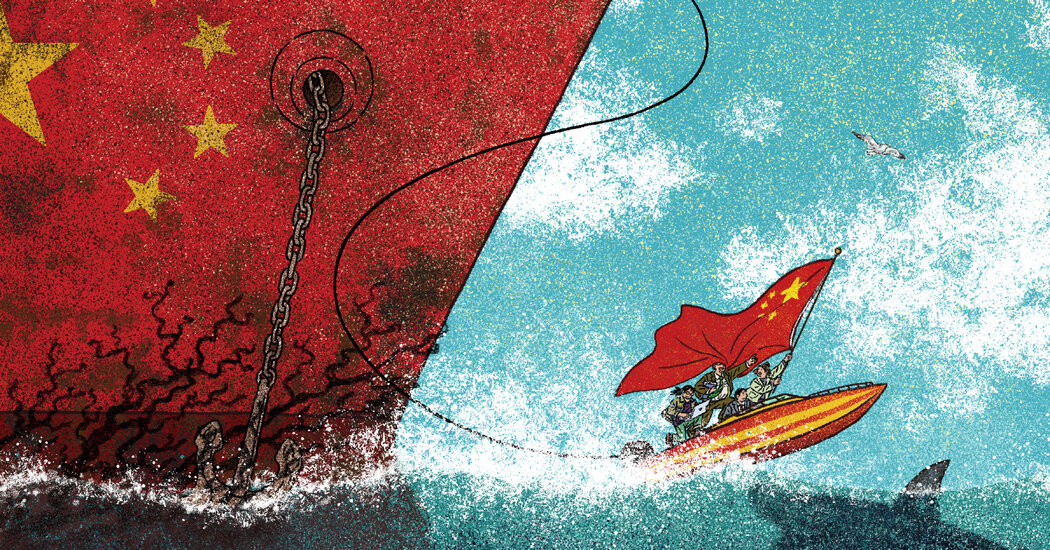The first thing, and likely the most important thing, is that Ryan Reynolds and Rob McElhenney seem to be sincere. It is hard to be absolutely certain, of course: They are both actors, after all, and a 45-minute Zoom meeting is, on balance, probably not the ideal format in which to take the measure of someone’s soul.
If their enthusiasm and affection for Wrexham, the down-at-the-heels Welsh soccer team they bought two years ago — and the community that it calls home — is an act, though, then it is a convincing one. McElhenney watches Wrexham’s games these days, while “pacing back and forth, unable to sit still,” he said. “There is nothing quite like the anxiety soccer produces.”
If anything, he has got off lightly compared to Reynolds. McElhenney is a lifelong Philadelphia Eagles fan, a blessing and a curse that served to inoculate him — to some extent — against the ravages of fandom even as he fell quickly, “deeply and madly in love” with Wrexham.
Reynolds, on the other hand, was pure, unsullied, defenseless. He had nurtured something of a soft spot for the Vancouver Canucks and Whitecaps, his hometown hockey and soccer teams, but admitted he would be stretching it to identify as a fan.
At first, he wondered if he was resistant to the sensation. He caught only half of Wrexham’s first few games after his and McElhenney’s takeover was completed in February 2021. He was, by his own admission, “pretty passive.” It did not last. When it hit him, it him hard.
“It is a horrible, cyclical, prophetic hellscape that never ceases or ebbs,” he said, a sentence that suggests he has come to fully understand the appeal of soccer. “I love every second, but it’s torment in equal measure. Every second is pure agony. It’s a new experience for me. I am in awe of people who have survived in that culture their whole lives.”
Neither McElhenney nor Reynolds had quite anticipated the extent of the emotional impact when, late in 2020, the former approached the latter with a proposal. McElhenney had spent a considerable portion of lockdown watching sports documentaries: the acclaimed “Sunderland ’Til I Die,” for one, and more significantly an HBO series on Diego Maradona. He decided he wanted to add his own production to the canon, and he wanted Reynolds — an acquaintance, rather than a friend, at that stage — to help bankroll it.
The result, “Welcome To Wrexham,” is heartwarming and funny and appealing, but it is also difficult to categorize. At one point, Reynolds describes it — perhaps as a slip of the tongue — as a “reality show,” but that feels reductive. So, too, does the faintly euphemistic term “structured reality,” a genre most recently characterized by Netflix’s glossy “Selling Sunset.”
But nor is it, strictly speaking, a documentary, not in the traditional sense, not in the way that “Sunderland ’Til I Die” was a documentary. There is a long-held rule among wildlife photographers and documentarians that they are present to observe, rather than intervene. Even David Attenborough hews to the mantra that “tragedy is part of life.” To prevent it, he said, would be “to distort the truth.”
“Welcome To Wrexham,” by contrast, is inherently interventionist. Wrexham had been drifting, hopeless and forlorn, in English soccer’s fifth tier for more than a decade when it was bought, out of the blue, by two Hollywood stars. Reynolds and McElhenney are not simply telling a story. They are shaping it, too.
That is exemplified, most clearly, by what appears to be an innocuous jump cut halfway through the show’s second episode. All of a sudden, the viewer is at home with Paul Rutherford, Wrexham’s locally born veteran midfielder. With more than a hint of pride, Rutherford shows off all the work he and his wife, Gemma, have done to their home: They put in the staircase, lowered the ceilings, installed a downstairs bathroom.
It turns out the house is about to get a little busier. The couple already have two boys; a third is on the way. Rutherford is currently building the baby’s crib. Later, he is shown playing soccer with his oldest son. He carries him home on his shoulders. It is heartwarming, touching and deeply ominous.
Anyone who has seen a nature documentary in which a young giraffe becomes separated from the herd, or a horror movie in which a teenager experiences a power failure, or an installment of “Match of the Day” in which a player is shown picking up an innocuous early yellow card, knows the cue. Something bad is about to happen.
The bad, in this case, comes in Wrexham’s last game of the season, a few months after the takeover. The team needs to win to make the playoffs. Rutherford, introduced as a substitute, is sent off for a reckless challenge. He is shown in the changing room, his chest heaving, urging his teammates to win without him. They do not. Wrexham is held to a draw. Its season is over. A caption appears. Rutherford’s contract expired the next day. He was released. He was the giraffe.
Such is the cold reality of soccer, of course, a sport that has no appetite for sentiment and — at the level Wrexham occupies — no money for it, either. Countless players suffer the same fate as Rutherford every season, victims of the game’s unapologetic mercilessness. His story, apart perhaps from the circumstances of his farewell, is not especially remarkable.
Reynolds and McElhenney are clear that, while they are ultimately responsible for it, they did not make that call. Personnel decisions are left to those on the ground at Wrexham, those who know the sport far better than they do. Nobody is hired or fired because it makes good drama; their commitment, Reynolds said, is simply to do the best by Wrexham as an entity.
Sometimes, sadly, that means individuals have to be cast as collateral. They take no pleasure in that. “It is a terrible feeling,” Reynolds said. “You don’t want to mess with people’s livelihoods. It’s genuinely awful. It feels mercenary, but it’s also part of our responsibility to the club.”
It is impossible not to feel, though, that their very presence placed a thumb on the scale. Of course, Rutherford — and the other players who were cut — might have been released by a different ownership group. Reynolds and McElhenney’s vision and ambition, though, made it certain. They are not simply telling the story. They are writing it, too.
McElhenney, certainly, is aware of the irony. Sports are compelling, he said, because they are “uncontrived,” authentic. “Any piece of scripted content has been contrived and created and manipulated to make you feel a certain way,” he said. “The masters can do that to great effect; they can make you feel like you’re not being manipulated, but that is the intent. There is no manipulation in sports. What is happening is what is happening.”
By documenting that, though, they are necessarily adding a layer of manipulation. Any documentary, McElhenney said, has to take a “point of view,” to tease out a narrative thread from thousands of unhelpfully unstructured and often inchoate real-life moments for viewers to consume.
“Sports are kind of meaningless to me unless I know what is at stake for someone,” Reynolds said. “What a player overcame to be there. What a club means to a community. If I think about the movies that made an impression on me, is “Field Of Dreams” a movie about baseball? Not really. It’s a movie about a father and son trying to connect. That context is what pulls you in.”
It is a tension that more and more clubs will confront as the lines between sport and story blur ever further. There are ever more documentaries in production — Amazon’s “All Or Nothing” series will follow the German national team at this year’s World Cup — as soccer embraces the same logic as Formula 1 did with “Drive To Survive”: What happens on the field is not the only thing that can be harnessed to drive interest and, as a result, revenue.
At heart, of course, what Reynolds and McElhenney have done with Wrexham is an inherently benign form of ownership, certainly by soccer’s standards. They have not saddled the club with debt. They are not using it to try to whitewash the image of a repressive state. They have given a club, and a town, reason to believe, and all for the price of a couple of camera crews.
Their ownership does not, they insist, hinge on “Welcome To Wrexham” being a success. They are in it “for the long haul,” Reynolds said, whether the audience is or not. They have, of course, already affected the story of the team, and quite possibly the town. But they are not mere observers. They are in the story, too, and so the team, and the town, have done exactly the same to them.
There but for the Grace of Todd
Perhaps, Todd Boehly will reflect, a brightly-lit stage at a high-profile business conference is not the place to start spit-balling ideas.
That, it seemed fairly clear, is all Boehly, Chelsea’s increasingly fascinating new owner, was doing when he brought up the notion of a Premier League all-star game this week at the SALT Conference in New York.
His remark was not, in any reasonable reading, a “proposal.” It was a top-of-the-head sort of a suggestion, a back-of-the-envelope example. There was no PowerPoint presentation. He had not run the numbers. He was not submitting it to a vote. He was simply discussing ways in which English soccer — famously impoverished — might seek to generate yet more precious revenue, and an all-star game was the first thought that came to mind.
None of that seemed to dampen the immediate storm of criticism generated by Boehly’s indulgence in some momentary blue-skying. Nobody, at any point, seemed inclined to treat it as nothing more than an idea. And why should they? It was far more fun to take it very seriously indeed.
There were, after all, so many reactions available. Some of them were valid, since it is not, deep down, a very good idea. Dressing it up as a way to pump more money into the rest of the soccer pyramid was almost as transparent as it was cynical. As Jürgen Klopp said, there is player welfare to consider. As the Daily Telegraph’s Sam Wallace pointed out, it does not work on a practical level: the desires of the English are not the only factor in determining soccer’s calendar, a sentiment Bayern Munich’s fans clearly share.
The most frequent reaction, though, was also the most ferocious. To many, Boehly’s suggestion was nothing less than an outrage, a betrayal of English soccer’s history, a misreading of its nature, an irruption of its purity. To Gary Neville, it was further proof that American investment into the Premier League represents a “clear and present danger” to English soccer.
There were many ways to react to this outpouring of scorn, too. You might ask whether Neville was quite so upset by all of the money pouring into the Premier League from American broadcasters, or whether he was so troubled by Boehly’s shock-and-awe spending spree on Chelsea’s squad this summer.
Or you might point out that an all-star game is certainly no more of an imposition than the Community Shield, and much less of one than the Premier League Asia Trophy and the Florida Cup. Best of all, you might suggest that Neville should be old enough to remember the various exhibition games between invitational teams in the 1980s. They weren’t called all-star games, of course, but that is precisely what they were. Boehly’s idea is, it turns out, neither American nor new.
Mostly, though, it was hard not to notice the many layers of irony present in both the statement and the backlash.
It is, certainly, one of the curiosities of soccer’s era of international investment that so many billionaires seem to think the most popular sport in the world, the one they have had to pay a fortune to buy into, just isn’t good enough at making money.
It is another that they are so often accused of misunderstanding the sport. Boehly, like everyone else, has been attracted to soccer because it has spent the last three decades in a relentless, fervent and frequently amoral pursuit of profit. His idea might not have been a good one, but it is perfectly in line with the nature of the business he has bought into.
Correspondence
A wonderful way to start the week, thanks to Nona Cleland. “Would you be kind enough to explain the meaning of the corner flag photo?” she asks, in reference to a caption from last week.
I would be delighted, Nona: clubs tend to use a stock photo of a limp, mournful corner flag, emblazoned with their crests, when they release a statement imparting bad news, most frequently the firing of a manager. I don’t quite know how it started — though I am, I admit, tempted to find out — but it is now a fairly reliable visual clue that a crisis has reached its inevitable conclusion.
There has also been a bit of a backlash to Tom Karsay’s suggestion that fans might object more to big-money acquisitions if they remembered the money funding them came, ultimately, from their own pockets. “Quite the opposite, when the alternative is our money going into the owners’ pockets and staying there,” wrote John Nielsen-Gammon.
Brian Marx, meanwhile, pointed out that fans “choose to consume top league club soccer, it is not forced upon us. Also, for the fans of any specific team, the signing of a difference-making player, expensive or otherwise, is always another chance to allow those rays of hope to stream in the window.”
And we can finish with a question, one that will make no sense to those of you who skipped last week’s newsletter, from Rich Johnson. “Which Premier League manager do you believe would have the most success at interpretive dance?” he wrote. This would, I think, be an intensely competitive field. Most managers, after all, essentially spend whole games performing elaborate dance routines. Antonio Conte’s body language is powerfully expressive, but it’s hard to see past Pep Guardiola, who often has the air of a man performing a complex choreography.



